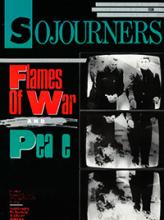For decades the poetry and peace witness of Daniel Berrigan have touched the souls of people hungering to make change in the world. Now we can also be touched by the story of his life journey.
The following is excerpted from Berrigan's autobiography, published in October 1987. It covers a slice of his life during the Vietnam War years, spanning his exile from the Jesuit community as a result of his peace commitment, his work as a activist and professor at Cornell University, his rescue mission to Hanoi, and his participation in the burning of draft files at Catonsville, Maryland, an action which galvanized resistance to the war.
His words both affirm his deep conviction about peace and unfold the doubts and wrestlings that preceded his decision to join the Catonsville action. They speak deeply to all who want to walk with integrity in their journey to make peace. --The Editors
THERE WAS the Vietnam War. The war was to become an all but permanent horror, a kind of great salt machine in the sea, churning out tears, bitter unrest, and death, turning national life to a welter of sorrow and division.
The Cold War was sinking world temperature to a zero, the war in Vietnam was expanding more savagely.
Warmaking required no center; its reality was that of a machine, which we rightly call a war machine. And a machine has no center; it has parts, which are required only to mesh and move in gear.
The question for me, as peacemaking came to be a question, was one of soul, of center. The soul of peacemaking was simply the will to give one's life. As war sanctioned the taking of life, peacemaking must sanction the giving of life.
Read the Full Article

